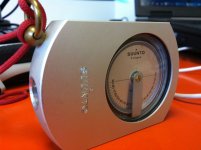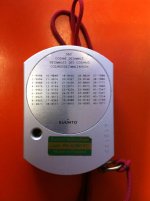sketchrbob
New member
The First Compass Question is what do I do if I have a bubble in my compass?
The obvious answer is to fill it. However, what should we use to fill it? and will it leak out again? The oil in compasses is a special oil of a definite viscosity and supplied by the manufacturer. Ritchie uses one grade of oil for all their compasses while Danforth uses a No.35 in their regular compasses and a No. 50 (heavier weight) in their high speed compasses.
Many of the Marine Supply stores sell small quantities of compass oil and that would be the best source to fill the compass. I used to keep my oil in the freezer so that it would condensed to its smallest volume. If you are just adding a small amount you would not need to do that. Find the fill screw on the side of the compass and remove it. Hold the compass so the fill hole is upper most. You can add the oil with a medicine dropper or a short length of plastic tubing using the syphon method. Yes, it does not taste very good if you start the syphon by mouth, but spit it out and rinse out your mouth and it won't hurt you. I started all my syphons that way for 18 years and I am still here so it can't be too poisonous!
What if you can't find any compass oil for sale? Well No.1 Kerosene is probably pretty close and should work ok. I had a customer call me from the Canary Islands once and wanted to know what to use. I told him to use Gin and I guess it worked ok. Sad way to use the gin though. Whatever works!
You may find that after filling the compass there is a small bubble that still remains. Try rocking the compass to get the air bubble to pop out of the fill hole. If it does you may have to add a small additional amount of oil. You may have to go through this procedure several times. Yes I know it can be frustrating but stick with it.
Why do compasses get bubbles in the first place? The dome sits on an "O" ring and with the passage of years the "O" ring gets tired and with cold weather the oil tries to contract and pull air in past the "O" ring causing the bubble. So if you are successful in filling the compass it is a good idea to remove the compass from the boat during the cold weather. The other solution is to send the compass back to the repair center and have a new "O" ring installed.
Most of the compasses today are Ritchie and that is a good thing as they make one of the best compasses. They have their own repair department. I know it is good because I went through their repair training course. They make all their own compasses at their modern plant in Pembroke Massachusetts. Their address is E.S. Ritchie & Sons, 243 Oak Street, Pembroke MA 02359. Phone is (781) 826-5131. Ask for the repair department. They can give an estimate of cost and tell you how to ship the compass. If it is a Danforth Compass you can call Viking Instruments. Phone is (781) 331-3795. I believe Dirigo Compasses in Washington State may repair compasses but you west coast sailors should know more about that.
What if you don't do anything about a bubble in your compass? Well actually it will not do any harm and will not affect the accuracy of the compass. If the bubble is small and does not bother you, live with it. It may grow larger over time, but you can deal with that later.
That is enough to start this subject off so we are ready for your comments, questions and sarcastic remarks!

The obvious answer is to fill it. However, what should we use to fill it? and will it leak out again? The oil in compasses is a special oil of a definite viscosity and supplied by the manufacturer. Ritchie uses one grade of oil for all their compasses while Danforth uses a No.35 in their regular compasses and a No. 50 (heavier weight) in their high speed compasses.
Many of the Marine Supply stores sell small quantities of compass oil and that would be the best source to fill the compass. I used to keep my oil in the freezer so that it would condensed to its smallest volume. If you are just adding a small amount you would not need to do that. Find the fill screw on the side of the compass and remove it. Hold the compass so the fill hole is upper most. You can add the oil with a medicine dropper or a short length of plastic tubing using the syphon method. Yes, it does not taste very good if you start the syphon by mouth, but spit it out and rinse out your mouth and it won't hurt you. I started all my syphons that way for 18 years and I am still here so it can't be too poisonous!
What if you can't find any compass oil for sale? Well No.1 Kerosene is probably pretty close and should work ok. I had a customer call me from the Canary Islands once and wanted to know what to use. I told him to use Gin and I guess it worked ok. Sad way to use the gin though. Whatever works!
You may find that after filling the compass there is a small bubble that still remains. Try rocking the compass to get the air bubble to pop out of the fill hole. If it does you may have to add a small additional amount of oil. You may have to go through this procedure several times. Yes I know it can be frustrating but stick with it.
Why do compasses get bubbles in the first place? The dome sits on an "O" ring and with the passage of years the "O" ring gets tired and with cold weather the oil tries to contract and pull air in past the "O" ring causing the bubble. So if you are successful in filling the compass it is a good idea to remove the compass from the boat during the cold weather. The other solution is to send the compass back to the repair center and have a new "O" ring installed.
Most of the compasses today are Ritchie and that is a good thing as they make one of the best compasses. They have their own repair department. I know it is good because I went through their repair training course. They make all their own compasses at their modern plant in Pembroke Massachusetts. Their address is E.S. Ritchie & Sons, 243 Oak Street, Pembroke MA 02359. Phone is (781) 826-5131. Ask for the repair department. They can give an estimate of cost and tell you how to ship the compass. If it is a Danforth Compass you can call Viking Instruments. Phone is (781) 331-3795. I believe Dirigo Compasses in Washington State may repair compasses but you west coast sailors should know more about that.
What if you don't do anything about a bubble in your compass? Well actually it will not do any harm and will not affect the accuracy of the compass. If the bubble is small and does not bother you, live with it. It may grow larger over time, but you can deal with that later.
That is enough to start this subject off so we are ready for your comments, questions and sarcastic remarks!


